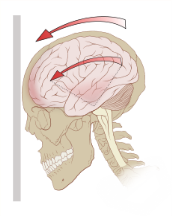Head / Neck Injury and Concussion
You cannot have a head injury without a neck injury. They are intimately connected! – Statement made by Dr. Hasick to Dr. Joseph C. Maroon, MD, FACS at MRI conference April 20131
A concussion is a significant and sometimes serious event involving the neck, head and brain. Given the right care and enough time to properly rest and recuperate, the brain can fully recover from such an injury. NUCCA care is an important ingredient in encouraging complete recovery.
There has been a recent increase in awareness of the potential health impact of concussions and mild traumatic brain injuries. Our research2 indicates that the correction of the upper cervical spine with the NUCCA treatment protocol provides an important component in the treatment of migraines, head injuries and concussion.

As a result of his participation in the Calgary Migraine Study, Dr. Hasick was invited to speak at the 4th Annual Canadian Neurovascular Health Society Conference in Saskatoon. His Presentation explored how the brain’s vascular system and brain function (neurophysiology) responded to an optimal NUCCA correction.
Dr. Hasick attended a healthcare symposium presented by McLeod Law on “Current Advances and Trends in MTBI (Mild Traumatic Brain Injury) and PTSD (Post-Traumatic Stress Disorder)”. This conference reviewed the most current and optimal ways to evaluate, diagnose and support treatment of concussion or mTBI. The idea has traditionally been held that the majority of people fully recover from these injuries, however it was suggested by the panel that rather than recovering, many people’s neurology goes into an “adaptive state” of functioning, not an optimal state. This can be seen in the disruption of sleep and other neurological compensations many years after the original injury.
Further research is planned at The Britannia Clinic utilizing a variety of new technologies to evaluate the integrity of the nervous system and its recovery after NUCCA care. What we currently know from our research and extensive amount of clinical experience is that it is profoundly important to have your neck and spine checked following any injury to the head.
Concussions, Mild Traumatic Brain Injuries, Head and Neck Injuries
A concussion is a head and neck injury usually caused by a direct blow to the head that can create a variety of physical, cognitive, and emotional symptoms. It is estimated that Traumatic Brain Injury occurs in 500 out of 100,000 individuals yearly in Canada and that approximately 1.3 million Canadians are living with an acquired head and neck injury. Symptoms can appear immediately after the incident or not for several days later and can vary widely. A concussion is not identifiable on x-ray, MRI or CT scan so it is important to watch for any of the possible symptoms. Many of the symptoms that arise from this are directly related to the neck injury. Since you can’t have a head injury without a neck injury it is important to always check the neck.
Common Symptoms of Concussion, mTBI and head and neck injury.

-
- Confusion or foggy thinking
- Memory problems
- Difficulty concentrating
- Irritability
- More emotional or sad than usual
- Nervousness or anxiety
- Headache
- Neck pain
- Back pain
- Vomiting or nausea
- Ringing in ears
- Dizziness or balance problems
- Fuzzy or blurred vision
- Changes in sleep patterns
- Changes in digestion
Treatment of The Injury
The most important thing to do if you have had a head and neck injury is consult a health care professional. Recovery programs are individual to each person and a number of factors determine the treatment protocol including the person’s history of previous injuries, age and mechanism of injury.
It is important to follow return to activity guidelines carefully and for progress to be monitored. Returning to activity while still injured places you at higher risk for another injury, a prolonged recovery and possible long-term symptoms.
Post-Traumatic Stress
Post-traumatic stress is an anxiety disorder that can result from exposure to one or more traumatic events. Recent research suggests there may also be physical effect of post-traumatic stress including changes in the brain hormones, changes in the brain chemicals and changes in the brain anatomy. As reported in a National Geographic article, studies on the traumatic effects of blast force on U.S. soldiers are also revealing unique changes in the brain3.
In a normal brain, the interaction between the hippocampus and the amygdala is important for processing emotional memory. It’s suspected that they both change in response to trauma as well.
Understanding the effect that the correction of the upper cervical spine with the NUCCA treatment protocol has on the brain is an important component to the successful integrative treatment of migraines, head and neck injuries and concussion.
If you or someone you know has experienced a head injury please contact our office for an evaluation.
References:
1. Dr. Maroon is highly invested in the prevention and treatment of concussions in high school, college and professional sports, specifically football. While working with the Steelers in the early 1990’s, the lack of an objective, reliable instrument to evaluate concussion symptoms became very apparent to Dr. Maroon. To fill this void, he and Dr. Mark Lovell developed ImPACT™ (Immediate Post-Concussion Assessment and Cognitive Testing), to assess presence and severity of concussion symptoms. ImPACT™ has become the world-wide standard tool to assess sports-related concussions, and has been used in over 4.5 million athletes. In 1994, Dr. Maroon joined the National Football League’s mild Traumatic Brain Injury Committee as concussion expert. This committee, which in 2007 was renamed National Football League’s Head, Neck and Spine Committee, is still in place.
2. Woodfield, H. Charles; Hasick, D. Gordon; Becker, Werner J; Rose, M. Sarah; Scott, James N.; Effect of atlas vertebrae realignment in subjects with migraine – an observational pilot study, BioMed Research International. 2015.
3. Blast Force, The Invisible War on The Brain, Caroline Alexander, National Geographic, 2015.
Other information on Concussion, Head and Neck Injury in the Media:





